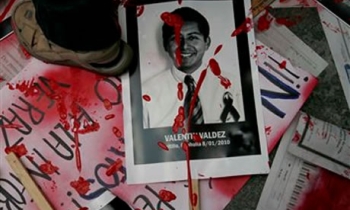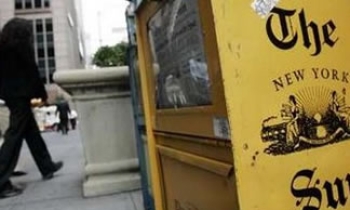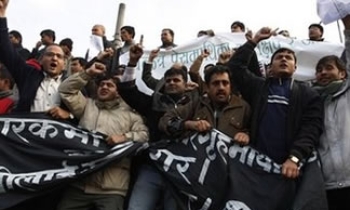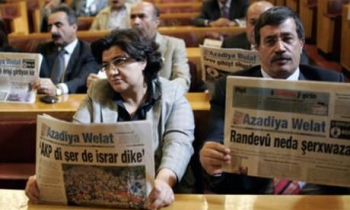"Gentleman" is not a term used very often to describe a reporter, but for any of us who knew Hugh Sidey, it is likely to be the first word that comes to mind. I had dinner with him just last Sunday here in Paris and was blown away, as always, by his energy, enthusiasm and experience. Hugh started covering presidents of the United States during the Eisenhower years for Life Magazine and then for Time. He met and wrote about every president of the last five decades, and he knew some, John F. Kennedy and George H.W. Bush among them, not only as subjects and sources, but as friends. Born in Iowa, Hugh was a fourth-generation newspaper man from the heartland, confident of his trade, secure about his ethics.
At 78, Hugh loved living. He and his wife Anne, married for 51 years, came often to Paris for fun or for speaking engagements, or both. They would book themselves into the best restaurants in town–I know they had reservations this week at Taillevent, Le Cinq, the Tour d’Argent, Stressa–to experience the delights of la ville des Lumières with that particular joy in life that Midwesterners have brought here since the days of Ernest Hemingway. Our dinner was at the relatively more modest Costes Hotel, where Hugh relished every bit of his haricots verts and his foie gras, every sip of his Tour de Marbuzet 2001.
Although he’d only arrived on Sunday morning after an all night flight from DC, Hugh wanted to talk late into the evening, and I couldn’t get enough. He wondered aloud what would have happened if Jack Kennedy had survived the shots from Lee Harvey Oswald’s mail-order rifle in 1963. (Hugh was in Dallas that day.) He said he thought that Kennedy would have been re-elected, but might not have made it through his next term: The love affairs and the links to the mob couldn’t have been kept quiet much longer, and probably would have done him in.
Later on Sunday night, Hugh mentioned that former CIA director Allen Dulles once told him the Soviets had smuggled a small nuclear bomb onto the third floor of their 16th Street embassy in Washington, D.C., just a few blocks from the White House. Hugh thought Dulles was kidding, but he was curious enough to put the question to Kennedy one day. Kennedy said, yeah, it was true, and Hugh, whose commonsensical instincts made him suspicious of the president’s penchant for conspiracy, said he just didn’t believe it. "Do you think you know more about this than I do?" asked the president.
I was still thinking about these tales Monday when the call came from a mutual friend that Hugh had had a heart attack, that the doctors were doing all they could, but that, probably, he wasn’t going to make it. By the time my wife and I arrived at the Plaza Athenée where Hugh and Anne were staying, there were two ambulances pulled up in front, but I could see the paramedics inside rolling up their equipment and stowing it away. Hugh’s body lay behind screens just off the lobby. The doctors and police were filling out papers.
The sense of loss comes later than the shock and the horror when a friend dies, but it’s that growing emptiness that stays with you for a long, long time. In Hugh’s case I feel as if I’ve lost touch not only with a man I cared about and a colleague I admired, but with a whole generation of American journalists who were apostles of decency.
For most of Hugh’s career, well into the 1980s, small-town newspapers told people what local editors thought they needed to know, and a handful of national media gave them what the press barons thought they ought to know. You could count the important national media on your fingers: Time and NEWSWEEK, The New York Times and to a lesser extent the Wall Street Journal and The Washington Post, AP, UPI, plus the three major broadcast networks–that was it. This could have been a terrible system, but in retrospect it seems a benevolent oligarchy. These media were not oblivious to market forces, but neither were they compelled to pander to them. They felt a duty to cover Washington politics, major economic issues and foreign news in considerable detail, even if only a fraction of their readers ever got past the headlines. They could dare to be boring, if that’s what it took to be responsible.
No longer. While so-called "news outlets" have multiplied–with hundreds on satellite television, millions on the Internet–the actual inputs have been cut back dramatically as formal news gathering organizations slash their budgets and decimate their staffs. Competition is all about building market share and the bottom line, not some intangible notion of prestige or civic duty. The result is like a return to the days of yellow journalism at the end of the 19th century, when paper was cheap and reporting cheaper. Competition for market share in those days led to violent sensationalism, narrow-minded jingoism–and war. No need to belabor the parallels.
The process of building, or re-building, a responsible American press was slow and difficult, and it wasn’t really until Hugh’s generation came of age in the 1950s that America’s national media felt strong enough to confront Washington’s demagoguery. (Edward R. Murrow’s devastating CBS attack on the Red-baiting Sen. Joseph McCarthy in 1954 came just a year before Hugh joined the staff of Life Magazine.)
I don’t think we can go back to those times now. Ours is a new age, and a different one. We can hope that responsibility, decency and common sense eventually will win out, but it's hard to spot any positive trends. So the loss of someone who was truly in touch with the good in the good old days is all the more painful.
The night Hugh died, after American Ambassador Craig Stapleton and his wife had come by the hotel to pay their respects and former President George H.W. Bush had called personally to give his condolences to the family, we tried to make small talk to overcome the sense of shock. There was some comfort in knowing Hugh had died very quickly, and with almost no pain. He and Anne and their daughter Sandy had just been seated at the Plaza Athenée restaurant. The amuse bouche came, along with a Champagne aperitif. The first course was served: Breton lobster with quince and apples. And then suddenly, as if letting out a sigh, Hugh’s life was gone. And hearing this, I couldn’t help but think of that phrase made famous among Americans in Paris during the Hemingway years, "Living well is the best revenge."









